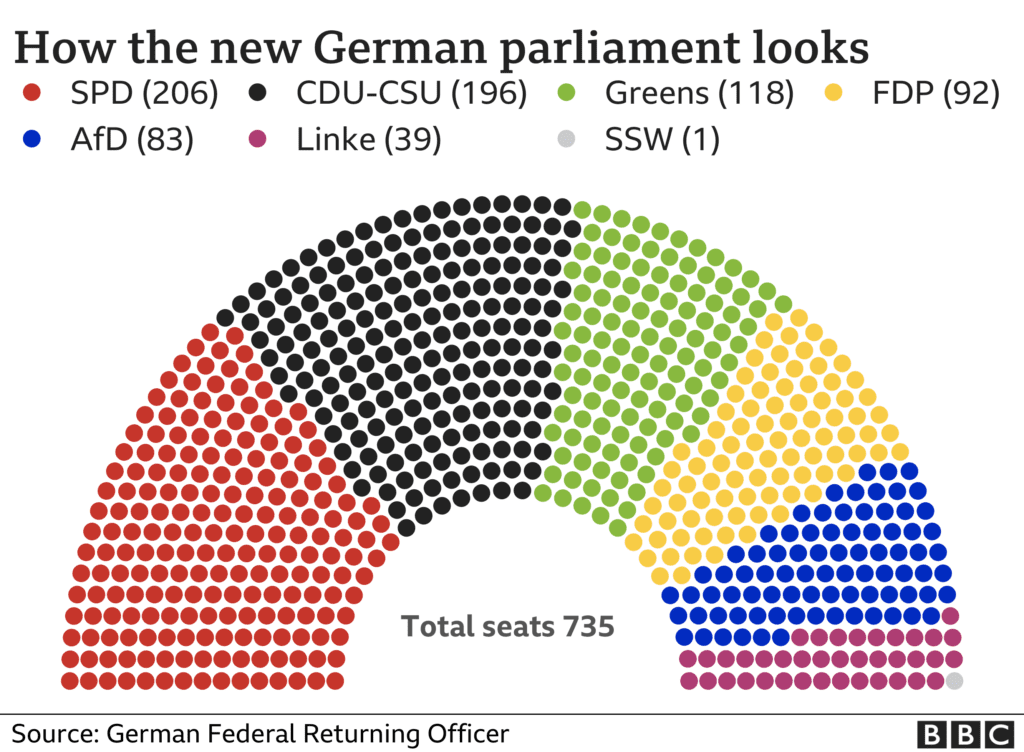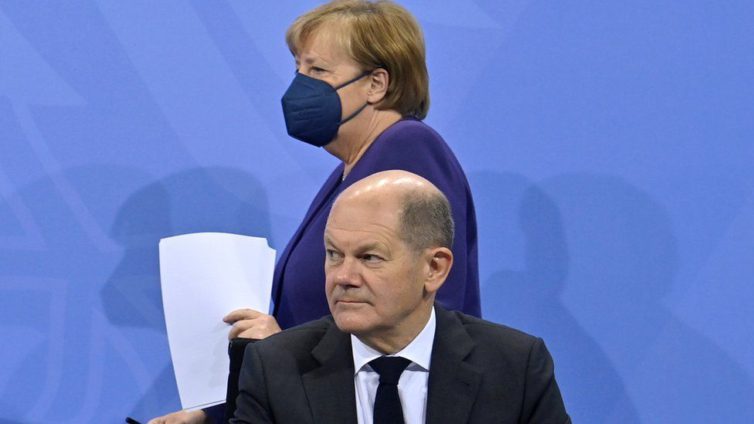Olaf Scholz has been confirmed as German chancellor, leading a three-party government that takes over from Angela Merkel after 16 years in office.
He was voted in by the German parliament, where his coalition has a substantial majority.
Mr Scholz's new government is formed of his Social Democrat party along with the with Greens and Free Democrats.
The handover of power marks an end to Mrs Merkel's 31-year political career.
Mr Scholz, a soft-spoken 63-year-old, steered the Social Democrats to election victory in late September, positioning himself as continuity candidate because he played a key role in the Merkel government as vice-chancellor.
He was given an ovation after the German parliament, the Bundestag, backed him by 395 votes to 303 and he will now go to see President Frank-Walter Steinmeier before returning at midday (11:00 GMT) to be sworn in.
Since the election his party has worked with the Greens and business-friendly Free Democrats on a coalition deal, which was finally signed on Tuesday. He is set to take over from Mrs Merkel at 15:00.
The new government has ambitious plans to fight climate change by phasing out coal early and focusing on renewable energy, but their initial priority will be on tackling the coronavirus pandemic. Health authorities have recorded another 69,601 cases in the past 24 hours and a further 527 deaths - the highest number since last winter.
He and Greens leader Annalena Baerbock, who becomes foreign minister, will also have to respond to fears surrounding Russia's military build-up near the border with Ukraine.
Although Russia has denied plans to invade its neighbour, Angela Merkel agreed with President Joe Biden and the leaders of the UK, France and Italy late on Tuesday that they would adopt a joint strategy to respond by imposing "significant and severe harm on the Russian economy".
One obvious economic measure would be to threaten Russia's Nord Stream 2 gas pipeline to Germany, which has been completed but is still awaiting approval from the German energy regulator. US officials say they have reached an understanding with Germany that the pipeline would be shut down, which would be a significant intervention.

First elected in December 1990, Angela Merkel was immediately given a ministerial job by then-Chancellor Helmut Kohl.
But she then helped oust him and became Christian Democrat leader in 2000, before becoming chancellor herself in November 2005.
She will still have an office close to the Bundestag, in a flat that was once used by Margot Honecker, once dubbed the most powerful woman in communist East Germany.
Latest Stories
-
Kojo PJay wins Comic Writer of the Year at 2025 Ghana Comedy Awards
2 minutes -
Ghana’s tax system encourages evasion, enriches just a few – Prof. Quartey warns
5 minutes -
2025 Unity Cup: Otto Addo expects ‘tough battle’ against Nigeria
8 minutes -
Academic integrity under threat: The rise of exam scams
25 minutes -
‘He didn’t get the recognition he deserved’ – Mikel Obi on Essien
59 minutes -
Kumasi: Fire destroys several residential apartments at Bomso
1 hour -
Today’s front pages: Wednesday, May 28, 2025
2 hours -
Hilda Aku Asiedu: Ghana’s carbon credit pension proposal
2 hours -
Cedi to continue holding firm against dollar; one dollar going for GH¢11.80
2 hours -
Dietary Management of Polycystic Ovary Syndrome: A Ghanaian Perspective
2 hours -
Orca Deco deepens commitment to Ghanaians with enhanced ‘Stronger cedi, lower prices’ initiative; earns presidential acclaim
2 hours -
McDan honoured as Salt Mining CEO of the Year for transforming Salt Industry
2 hours -
Minister of Agriculture to attend Canada-Ghana Agribusiness Summit in Saskatoon, Canada
3 hours -
Flooding is a national crisis; we must back laws with community action – Asenso-Boakye
3 hours -
John Mahama: Trump’s unfounded attack on Cyril Ramaphosa was an insult to all Africans
5 hours

